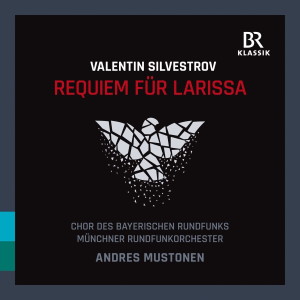
Valentin Silvestrov (b. 1937)
Requiem für Larissa (1999)
Priska Eser (soprano), Jutta Neumann (alto), Andreas Hirtreiter (tenor), Wolfgang Klose (bass), Michael Mantaj (bass)
Bavarian Radio Chorus
Munich Radio Orchestra/Andres Mustonen
rec. live, June 2011, Hërz-Jesus-Kirche, Munich
BR KLASSIK 900344 [60]
Valentin Silvestrov is considered Ukraine’s finest living composer; regrettably, little of his music is known here. He has been performed by small groups of musicians and hopefully, before long, his art will be appreciated more fully as his voice is vitally important.
Born in Kiev, Silvestrov studied as a civil engineer while also taking music evening classes before he entered the Kiev Conservatoire in the composition class of Lyatoshinsky – Ukraine’s greatest 20th-century composer. His music was heard most often in Leningrad and other Russian cities rather than in Kiev. In 1970, his style changed to a ‘meta-music’ form similar to that of Pärt, Kancheli and Vasks. With the break-up of the Soviet Union, he became more accepted, yet by this time, he was working and living in Germany as part of an Artists-in-Berlin programme.
The Requiem is unlike those composed by Mozart, Berlioz or Verdi; in this deeply troubled and personal lament dedicated to the loss of the composer’s lifelong companion and wife, Larissa Bondarenko, with its allusions, retrospectives and epilogue about their life together, we are sharing in his personal grief. Silvestrov sets the words of the Latin mass but without a strict liturgical observance of the texts. The theological order of the Catholic Missa pro defunctis is suspended, and words float away from each other, liberally and pitifully, without any religious context. As Wolfgang Stähr writes in the notes: ‘This is less a struggle for language than a confusing stream of consciousness, filled with fleeting memories and thoughts.’
The opening ‘Requiem aeternam’ is like a death knell, superbly announced by the low strings and the orchestral piano creates an aching groan of agony as the women’s choir sings ‘Requiem aeternam dona eis, Domine, et lux…’. There is a hint of Ligeti in the orchestration, as we hear repetitive singing from the men’s choir, disturbed by the outstanding woodwind with shrieks from the oboes and clarinets bringing a note of terror. The darkly threatening chords by the trombones and tuba set the tone splendidly before a sense of mystery is created, as if we were on a journey through space invoked by the eloquent strings and the melodious synthesiser. The audaciously dramatic trumpets open the second part, ‘Tuba mirum spargens sonum…’ with powerfully violent chords before the menacingly expressive male choir sing of the terrible day of wrath and an eery, unworldly harmony emerges from the synthesiser.
For me, the most powerfully emotive section is the ‘Lacrimosa dies illa,’ opened by the compelling soprano of Priska Eser against the rising and falling harmonies from the expressive strings, as if waves were crashing against the shore. This passage heralds the distinctly lyrical tenor of Andreas Hirtreiter singing ’That day is one of weeping…’, accompanied by percussion and piano. The fourth movement is an important and moving section that uses texts by the Ukrainian national poet Taras Shevchenko, ‘Goodbye, o world, o earth, farewell…’ opened by Hirtreiter who is then joined by both choruses. There is a wonderful sequence of beautiful singing by the women’s choir in the unique ‘white voices’ of the Ukrainian singing tradition, followed by repetitions of the Latin texts, ‘Agnus Dei, miserere nobis…’ from the women’s chorus, at one point accompanied by the virtuosic solo violin – and in memory of their life together, Silvestrov introduces passages of a theme by Mozart accompanied by strings and alto Jutta Neumann , before evocations of the wind on the synthesiser.
The repeat of the opening ‘Requiem aeternam’, sensitively sung by the women’s choir, adds gravitas and emotion; the final ‘Requiem aeternam’ is a reprise of the mourning chords by the trombones and tuba contrasted by bright woodwind, offering a contrast between light against darkness as this deeply moving piece comes to a close.
The CD is enclosed in a cardboard sleeve with notes and texts in a 32-page booklet in English and German, and black and white photos of the composer and the musicians. The performance by the Chorus of Bavarian Radio and the Munich Radio Orchestra under Andres Mustonen is magnificent. There is another recording on ECM performed by the Ukrainian National Symphony Orchestra and the Dumka Choir conducted by Vladimir Sirenko that I have not heard; nevertheless, I can recommend this new issue to those who are interested in modern music from Eastern Europe.
Gregor Tassie
Help us financially by purchasing through





















